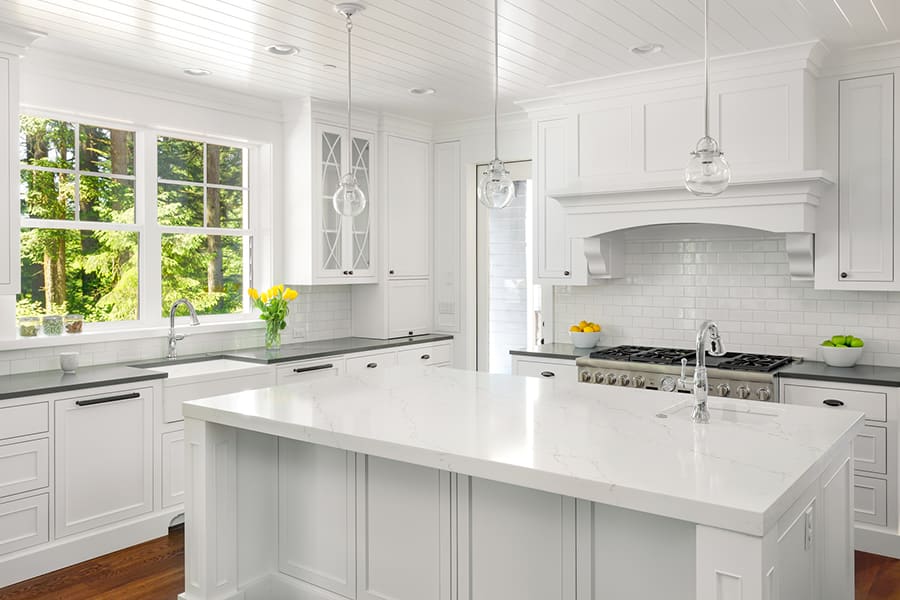About countertops
Quartz, granite and marble are three of the best and most popular countertop options on the market. Granite countertops have risen top popularity over the past few decades, while marble countertops have been a focal point of homes for years on end. And then there is quartz countertops, which have also risen in popularity in recent years as a viable alternative to both granite and marble options. But how do these three countertop materials compare to each other? That is the question that this guide will answer.
Characteristics of granite countertops
Granite countertops are some of the most beautiful and tough surfaces you can find. You will have a seemingly endless array of colors and styles to choose from when it comes to this amazing natural stone. Granite is very durable, which makes it an ideal countertop material for any home. No matter where you install a granite countertop, it will look amazing. The only downside to granite – if it can even be considered a ‘downside’ – is that you must make sure to keep up on sealing. That said, having to apply a sealer to your counter- top roughly once per year is not any kind of major inconvenience.
Granite
Postives
Negatives
Brings natural beauty to the home
Requires yearly sealing
Durable
Stain resistant
Heat resistant
Heat resistant
Request an accurate and professional estimate
Marble
Marble is truly a timeless classic when it comes to building materials. While there are many options of countertop materi- als that are beautiful, many homeowners simply feel that there is no material as beautiful as marble. With numerous colors and styles available, many of which include elegant veining, it is surely hard to match the beauty of marble countertops. While much of marble’s appeal lies in its appearance, the material is also relatively durable. However, you must keep up on maintenance if you want to keep marble ocuntertops in good shape. Because marble is more porous than granite, the countertops will require re- sealing more often. You will have to re-seal marble countertops a few times per year. Marble is a terrific option for elegant countertops. There is no denying the beauty that this stone can add to your space. We do not recommend this for kitchens, but a guest bathroom would be an area with less traffic that marble would work well in Below is a table that lists out the positive and negative.
Marble
Postives
Negatives
Timeless apeal
Needs frequent maintanance
Variety of colors and styles available
Acidic substances and hard cleaners can cuase damage
Quartz countertops are engineered surfaces that are made from a combination of roughly 90 percent ground natural quartz and about 10 percent polyresin. These specific percentages can slightly differ based on brands but will always be in the same area.
Although quartz countertops are engineered, the surfaces are incredibly attractive. Due to the fact that they are manufactured, quartz countertops have many different styles, including those that replicate natural stones like granite and marble. Another bene- fit that results from these surfaces being engineered is that they are non-porous, which separates them from both granite and marble. This means that quartz countertops do not require the sealing that granite and marble countertops do.
One thing you must watch out for is not exposing quartz countertops to excessive heat. High levels of heat can melt the resin and cause a permanent burn mark on the surface. Never set down hot pots or pans on a quartz countertop. Heat resistance is one of the only areas in which quartz does not match or surpass other countertop options.
Homeowners often turn to quartz as an alternative to not only granite and marble but materials such as solid surface as well. While quartz can closely compare with granite and marble, it is of better quality than solid surface countertops. The table below displays the positive and negative qualities of quartz.
Although quartz countertops are engineered, the surfaces are incredibly attractive. Due to the fact that they are manufactured, quartz countertops have many different styles, including those that replicate natural stones like granite and marble. Another bene- fit that results from these surfaces being engineered is that they are non-porous, which separates them from both granite and marble. This means that quartz countertops do not require the sealing that granite and marble countertops do.
One thing you must watch out for is not exposing quartz countertops to excessive heat. High levels of heat can melt the resin and cause a permanent burn mark on the surface. Never set down hot pots or pans on a quartz countertop. Heat resistance is one of the only areas in which quartz does not match or surpass other countertop options.
Homeowners often turn to quartz as an alternative to not only granite and marble but materials such as solid surface as well. While quartz can closely compare with granite and marble, it is of better quality than solid surface countertops. The table below displays the positive and negative qualities of quartz.
Quartz
Postives
Negatives
Beautiful
Cannot withstand high levels of heat
Many color and style options
Non-porous
Durable
How do the costs compare?
The table below will give you an idea on how the typical costs compare between these three countertop options. Have additional questions? Call or stop by our Shreveport, LA showroom today.
Costs
Granite
Between $35 to $75 per square foot
Marble
Between $40 to $100 per square foot
Quartz
Between $50 to $120 per square foot













